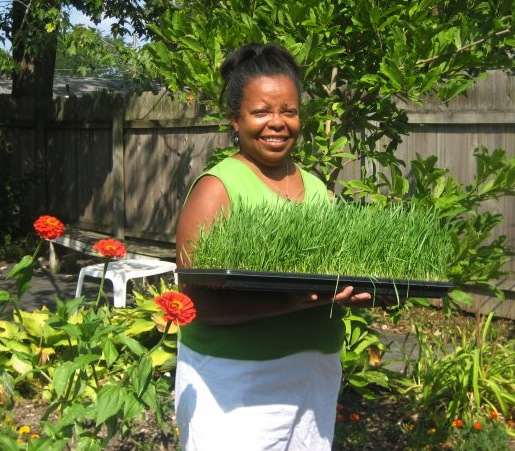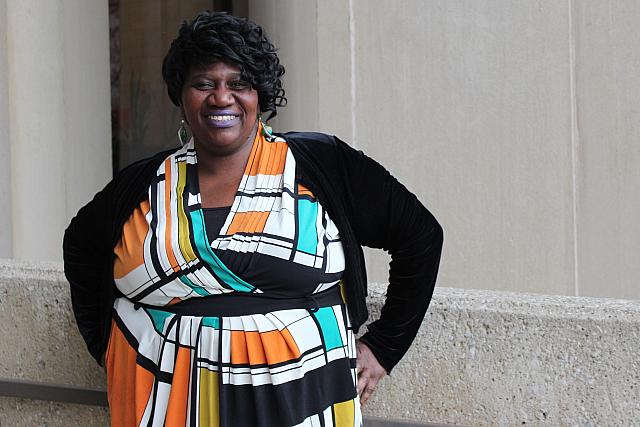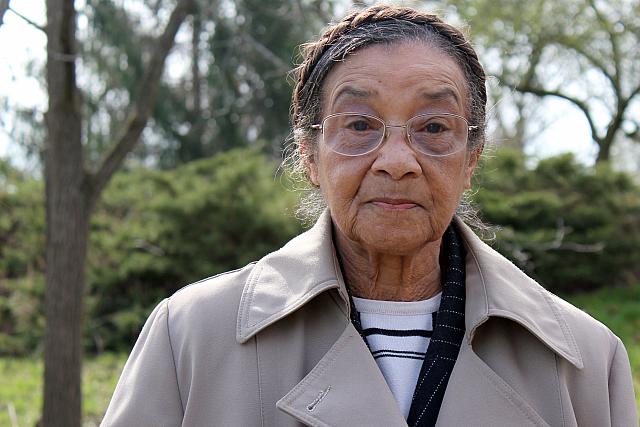 Photo by Yvette Chen OC '16Oberlin resident Che Gonzalez is a librarian at the Oberlin Public Library. A few years ago, she started a home-based business for affordable, healthy foods. Gardening since she was a kid, Ms. Gonzalez grows many of her own vegetables at home.
Photo by Yvette Chen OC '16Oberlin resident Che Gonzalez is a librarian at the Oberlin Public Library. A few years ago, she started a home-based business for affordable, healthy foods. Gardening since she was a kid, Ms. Gonzalez grows many of her own vegetables at home.
Q: Some people think of “sustainability” as actions that improve the environmental, economic, and social well-being of the community? How would you define “sustainability” for yourself?
A: Sustainability to me is a lifestyle. I grew up in a community of people who worked and played together. Families grew and preserved their own food and shared with one another. My father planted fruit trees and every year, at least three vegetable gardens. I remember picking blackberries all day long in what we called “the orchard”. Someone, long ago, planted fruit trees, strawberries, raspberries, and blackberries on this land not far from our house; my mom made blackberry preserves and blackberry pies. We didn’t have a smokehouse; but there was a family on the next street that raised chickens. Folks had food in their yards, even in the city limits. My relatives had concord grapes, cherry, mulberry, apple, and pear trees. In that lifestyle people were so much kinder to each other – neighbors visited more often. Yeah, folks sat on their front porches until nightfall – community.
Q: What actions and practices in your recent life do you feel are sustainable?
A: I had a home-based business, and still do, sort of. I made raw vegan cheesecake out of cashews and coconut oil. I planted food that was used for the vegan snacks that I sold. The effort I put into the planting and harvesting was more cost effective when compared to bulk purchases of these items at the food terminal in Cleveland. And I did not use pesticides in my garden – my produce was organic from heirloom seeds. Thus, I was able to keep production costs down.
Q: Do you have any specific messages you would like to tell other community members about sustainable living and care for the environment?
A: We can’t leave the world in a mess for our children to clean up. Now is the time to share our experiences and to teach by example. The process starts with each individual, one person at a time. Everyone can’t or won’t attend meetings about because they may not understand how the lifestyle can benefit them – all they see are tax increases.
Q: How do you think that reversal can happen?
A: I think educating the public is the most important part. As a result of school programming, many families are educated by their children. I was didn’t understand what all the “hoopla” was about until I attended an Oberlin Project meeting; then I thought, “Oh, okay this is gonna work for the whole village.”
Q: We’re talking a lot about the word “sustainability.” Are there other words you personally think of when you think of connection with the Earth or being engaged in a vibrant community?
A: It’s returning to Eden, going back to the old ways. I look at the Walton’s on television …the way people lived. Life seemed so simplistic in the 1930s. We need to be conscientious of the effects of our actions on other people, socially, physically, and economically. Just simplifying your life.
]]>
 Words to describe Oberlin.
Words to describe Oberlin.
Diverse, unique, different, different perspectives religions and people, traditional
When did you come to Oberlin? Why?
She has been in Oberlin for 7 years. Wanted to bring her daughter to school here.
What is your definition of Sustainability?
SPE - spiritually, physically, and economically.
Sustainability to me means keeping your resources. Because we’re in trouble. Cause we run out of resources - water, electricity. Sustaining everything. Use it in a productive way. Don’t use all your resources all at once.
Why is sustainability important to you?
“For one reason, It’s good for your health. Two, less cars. I mean, Oberlin’s so small that you don’t need to drive your car to IGA. You don’t need to drive your car to the library. I mean seriously. Also the cost of oil to place into your car - that’s another issue. And also pollution in the air...All those components work together. So I think more people need to walk or take different forms of transportation.
How would you communicate that to other people?
I think that our society resists change. But change is part of the environment. If you want the environment to survive in the future for yourself and for my grandchildren, we have to change our way that we live our lives. And to protect the environment, because it’s our responsibility too.
What motivated you to start thinking this way?
Well, I don’t have a car and haven’t had a car in the last ten years (laughs), so it’s part of my life. And I think with me it was more health reasons than anything. Cause 4 years ago I couldn’t walk. I was a hundred pounds larger than this...It was time for me to change my way of living - jump on my bike, walk everywhere. So it’s my way of life. I have always walked or rode a bike to get where I need to go...
Specific messages for other community members?
SPE (spiritual, physical, and economical). Fitness is very important.
If you have a neighbor next door that’s going to the store, take that person to the store too...
Exercise and riding your bike is very spiritual. You’re getting close to nature. Oh I love nature, oh my goodness, I love nature. It’s beautiful! The fresh air into your body. So it all works together...We’re talking about obesity right now, right? So it all works hand-in-hand together.
Sustainability is using less as much as you can.
I come home and the house is lit up, I’m all ‘Why you have several lights on? You only need one on.’ [laughs]
Instead of taking a 30 minute shower take a 5 minute shower...
Recycle.
I think maybe during the summer time once a month, they could...do a bike fair, put on a bike relay in Oberlin. Get everyone involved with this, explain what are you guys doing. So everyone in the community feels part of something. You could have a bike relay with the children, go on the bike path for maybe 5 or 6 miles, explain why it’s good to do sustainability and exercise. I mean they need to do something to get everyone involved, to understand where they’re going. Right, I think maybe like a picnic or something...
[Asked about the Environmental Dashboard - located at Oberlin Public Library, Slow Train Cafe, and Prospect School]
Oh yeah I read those, I read everything. I think they’re informative, giving information.
]]> Photo by Yvette Chen OC '16Think about all the places you have walked. Have you walked to the public library? Or to school? To pick up some groceries downtown? Or to friend’s house?
Photo by Yvette Chen OC '16Think about all the places you have walked. Have you walked to the public library? Or to school? To pick up some groceries downtown? Or to friend’s house?
Margaret Christian has walked back and forth a countless number of times to these places and to others. Why not drive a car instead? There are a number of reasons she could tell you, from health reasons to environmental ones. There is also a fundamental difference for Ms. Christian in the way you perceive the town as a walker. She says, “I see the changes of the seasons, I see the cans that are left behind.” So perhaps walking can be a learning experience as well, explains Ms. Christian. A way to get in touch with the surrounding environment and to gain a better sense of the community, with all of its unique characteristics and rich history. Ms. Christian personally likes to walk to the Westwood cemetery, because it is a place she can come back to, remember and learn about the people that were here who make up the history of the town.
Ms. Christian also tells me that when she walks she notices the cans and trash that gets left on the street. Seeing this so directly has made her even more passionate about recycling and consciousness of waste. Moreover, she is able to see the larger cycles in our patterns of living - how day in and day out cans get left behind, or recyclables go in the trash, and the garbage men come to pick up the trash. Just a simple awareness of this cycle is important to Ms. Christian, and is in large part a result of her walking. And awareness of these patterns does more for her than confirm the need for recycling; in a larger sense, it has brought her to view Oberlin as one community that is connected in more ways than many people think about. As many people talk about a divide between Oberlin College and the Oberlin community, Ms. Christian emphasizes how important it is that the college “realize that they are intrinsically involved in the land. They are part of the community.” She hopes for all of Oberlin to see itself as “a community - period.”
In addition to a greater sense of connectedness, the health benefits of walking are also very important to Margaret Christian. “I don’t take any medications,” she says, “and I attribute it to walking.” Despite being the oldest in her family, Ms. Christian tells me she is the wellest. I was inspired to hear how walking in itself has had such a major positive effect on her life and wellbeing. To explain this to me in one brief sentence, Ms. Christian very eloquently says, “I walk to live.” I think these few words stuck with me the most at the end of the day - a beautiful reflection of the simple, yet powerful act that is a part of Margaret Christian’s life every day.
So perhaps walking can be a learning experience as well, explains Ms. Christian. A way to get in touch with the surrounding environment and to gain a better sense of the community, with all of its unique characteristics and rich history.
]]>